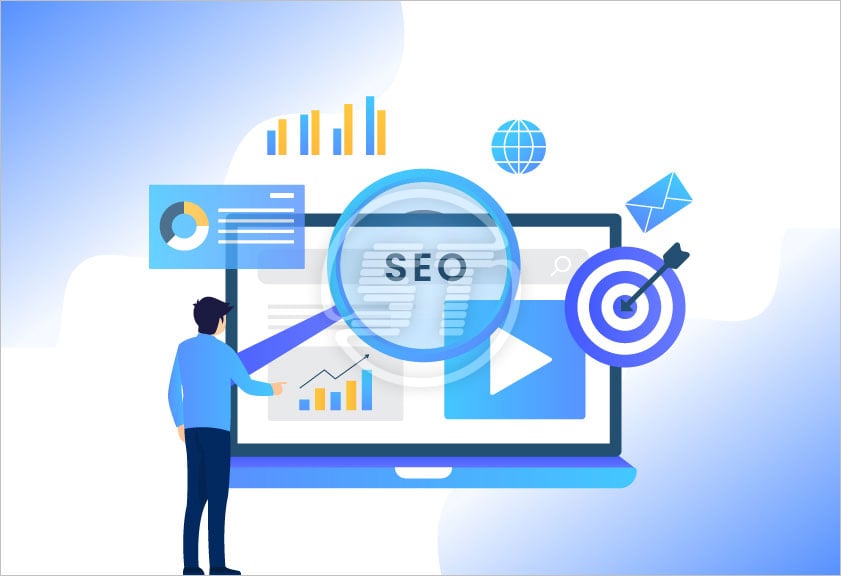For many SaaS startups, growth in the early days is driven by product innovation, founder hustle, and tightly targeted marketing. But as the business matures, expansion demands a more scalable, sustainable strategy – one that drives long-term visibility, trust, and demand.
That’s where enterprise SEO comes in.
Enterprise SEO goes beyond keywords and blog posts. It’s a strategic framework that helps SaaS companies compete at scale, dominate search visibility, and expand into new markets – without constantly increasing paid ad spend.
Let’s understand how scaling SaaS companies can use enterprise SEO to fuel their next phase of growth.
Rethink SEO as a growth engine, not a marketing tactic
In the startup phase, SEO is often treated as a side project – some blog content here, and a few optimized landing pages there. However, at scale, SEO must become part of the core growth strategy, integrated with product, sales, and marketing.
Enterprise SEO for SaaS means:
- Building topic authority across every stage of the funnel.
- Owning high-intent search journeys that span industries, use cases, and buyer personas.
- Structuring the site to support hundreds or thousands of content assets without chaos.
- When done right, SEO becomes a demand-gen machine that supports international expansion, product launches, and ABM (Account-Based Marketing) campaigns – all while reducing reliance on ads.
Map SEO to SaaS buyer journeys
SaaS buyers often go through a multi-touch journey, from initial pain-point discovery to product comparison and final decision-making.
The organization’s SEO strategy should reflect that complexity.
Top of Funnel (TOFU):
- Target problem-aware keywords (e.g., “how to streamline remote team communication”).
- Create guides, templates, or explainer content around common pain points.
Middle of Funnel (MOFU):
- Optimize for category-level and comparison searches (e.g., “Slack vs Microsoft Teams” or “best project management tools for agencies”).
- Develop in-depth product feature pages and use-case content.
Bottom of Funnel (BOFU):
- Capture high-converting intent with branded and transactional keywords (e.g., “[product] pricing,” “buy [SaaS]”).
Pro tip: Use intent data and analytics to continually refine content and optimize across the entire journey.
Build scalable content hubs and landing pages
One-off blog posts don’t scale. Organizations need a modular content architecture that can support rapid market or product expansion.
What that looks like:
- Scalable templates for industry-specific landing pages (e.g., “CRM software for law firms,” “time tracking for freelancers”).
- Dynamic pages for different use cases, roles, or regions, powered by structured data and content automation.
- Pillar-cluster strategies that establish topic authority and support internal linking.
These structures allow businesses to target hundreds of long-tail keywords efficiently – without bloating the site.
Internationalize with SEO in mind
If an organization is expanding globally, SEO is its digital passport.
How to reach out to overseas audiences:
- Implement Hreflang tags for multilingual or multi-regional content.
- Translate and localize – not just copy-paste – the highest-performing content and landing pages.
- Research local keyword variations and search behavior (e.g., “HR software” in the US vs “people management system in the UK”).
International SEO helps organizations land before they launch their digital assets – building visibility and interest before entering a new market.
Leverage product-led SEO opportunities
A SaaS product is a goldmine of SEO potential. Think beyond marketing pages. Tactics include:
- User-generated content (reviews, forums, public templates) that drives organic traffic.
- Public-facing tools or free feature previews optimized for search (e.g., ROI calculators, pricing estimators).
- Product documentation, help centers, or API guides that rank for long-tail developer or technical queries.
Product-led SEO can support adoption, education, and retention – all through search.
Measure that matters when a business scale
With enterprise SEO, reporting needs to go beyond keyword rankings.
Track crucial metrics like:
- Organic-assisted conversions across the funnel.
- Market penetration by region or vertical based on search performance.
- Content ROI by traffic, engagement, and influence on the pipeline.
Integrate SEO data with CRM and analytics platforms to tie performance directly to revenue growth – crucial for SaaS scale-ups seeking investor confidence or board-level buy-in.
Scale with strategy, not just spend!
Paid channels are powerful, but they’re expensive to scale. Enterprise SEO gives SaaS companies a durable, compounding advantage – one that grows with a specific product, market, and business goals.
From establishing authority to expanding globally, the right SEO strategy ensures that search engines not just found a website accidentally, but it is chosen by them.
So, if an organization is moving from startup to scale-up, it should ensure that enterprise SEO is in its toolkit. It’s not just about traffic – it’s about expansion with impact.
As Jeff Eisenberg said, “It’s much easier to double your business by doubling your conversion rate than by doubling your traffic.”
Thus, prioritizing the right strategies is crucial to scaling up a business!
Ready to take your SaaS product from startup buzz to scale-up success? At Skynet Technologies, we specialize in enterprise SEO services designed to fuel market expansion and unlock new growth opportunities. From technical optimization to targeted content strategies, our team delivers data-driven solutions that align with your business goals. Reach out [email protected] and discover how our SEO services can help your SaaS brand thrive in competitive markets!


